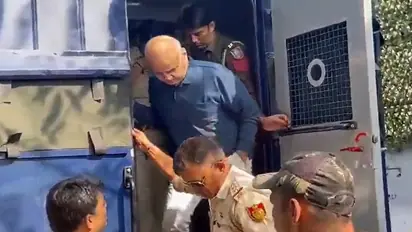Excise policy case: 7 things Supreme Court said in Manish Sisodia's bail order

Synopsis
The bench noted that Sisodia had been in custody for approximately 17 months with no commencement of the trial, which amounted to a deprivation of his right to a speedy trial.
The Supreme Court on Friday (August 9) granted bail to former Delhi Deputy Chief Minister Manish Sisodia in connection with the Delhi excise policy case. After 17 months of being jailed, Sisodia is set to be released following the Court's decision. A bench of Justices BR Gavai and KV Viswanathan issued the bail order, overturning both the trial court's and Delhi High Court’s decisions that had attributed the trial delays to Sisodia.
The Supreme Court found that keeping Sisodia in custody for an indefinite period violated his right to a speedy trial.
Supreme Court grants bail to AAP leader Manish Sisodia with conditions to surrender passport
The top court's decision was influenced by several key observations:
1. The bench noted that Sisodia had been in custody for approximately 17 months with no commencement of the trial, which amounted to a deprivation of his right to a speedy trial.
2. The Court stressed that the prolonged detention without trial was a denial of Sisodia's fundamental rights. The trial court and High Court should have given due consideration to this aspect.
3. The Court highlighted that Sisodia has deep roots in society and there was no substantial risk of him fleeing. It was determined that conditions could be imposed to mitigate any potential concerns.
4. The Supreme Court condemned the lower courts for failing to consider the injustice of prolonged detention without trial. The Court stated that relegating Sisodia back to the trial court for bail would be a ‘travesty of justice.’
5. The bench observed that most of the evidence in the case was documentary and already in possession of the ED and CBI, reducing concerns about tampering.
Mukesh Ambani's Reliance lays off 42,000 staff in FY24; Netizens quip 'salary spent on wedding'
6. The Court stressed that keeping Sisodia behind bars for an indefinite period would deny his fundamental rights. The Court acknowledged that Sisodia’s societal ties and lack of fleeing risk justified granting bail.
7. The Supreme Court noted that it would be unfair to subject Sisodia to continued incarceration when the trial had not yet started. The delays in the trial process warranted the Court’s intervention.
Stay updated with the Breaking News Today and Latest News from across India and around the world. Get real-time updates, in-depth analysis, and comprehensive coverage of India News, World News, Indian Defence News, Kerala News, and Karnataka News. From politics to current affairs, follow every major story as it unfolds. Get real-time updates from IMD on major cities weather forecasts, including Rain alerts, Cyclone warnings, and temperature trends. Download the Asianet News Official App from the Android Play Store and iPhone App Store for accurate and timely news updates anytime, anywhere.